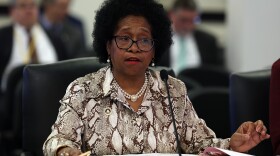The Speed Art Museum opened the reinstalled Native American galleries April 5, and closed them April 10.
The exhibit was closed to the public due to “unforeseen mechanical malfunctions near the Native American galleries,” according to an email response from Jackie Osman, the museum’s associate marketing and communications director.
“The malfunction was related to an HVAC issue,” Osman said, in part. She said the problem has since been resolved.
Planned programming around the Native American galleries will continue, including a community day event April 28. Osman said they will open the exhibit after the temporary closure before the community day, but did not provide a date.
LPM previously reported that the museum’s Native American galleries’ reopened around three months after the U.S. Department of the Interior’s update to NAGPRA, the Native American Graves Protection and Repatriation Act, went into effect.
“The temporary closure had nothing to do with NAGPRA guidelines, it was a completely separate mechanical issue that happened to occur at a very unfortunate time,” Osman said in the email.
Fari nzinga, the exhibit’s curator, and curatorial intern Sirene Martin previously told LPM the standards update came in the middle of their work on relaunching the galleries.
The new federal regulations now require museums to get free, prior and informed consent from Native tribes before displaying objects of cultural significance. They also require tribal consent before museums can conduct research or loan the objects.
Those objects include funerary articles from burial sites, sacred items connected to religious practice and objects of cultural patrimony — meaning those that collectively belong to a tribe, community or family, like a cradleboard or ancestral remains.
The Speed Art Museum reported it currently has eight ancestral remains, and that they have not yet repatriated them.
After the January update to the NAGPRA guidelines, museums across the country, including the American Museum of Natural History in New York, closed some Native American exhibits to review NAGPRA-sensitive items in their collections.
For the Speed’s exhibit, nzinga said they had reached out to over 200 tribes late last summer with a “wide open invitation” to consult with the museum on various NAGPRA-sensitive objects the museum had in its collection. The galleries also included contemporary work by Native American artists.
The previous installation of the Native American Art Galleries had 72 objects on view, according to the Speed Museum. The 2024 reinstalled galleries have 39 objects on display, but museum leaders did not provide a response to questions about whether they still needed to get consent for the pieces that aren’t on display.
The community day event April 28 is free and open to the public. It will include Indigenous music and dance performances, art and food on sale, and a public conversation with Meranda Roberts who is on the Speed Museum’s Native American Advisory council board and helped curate the exhibit.





